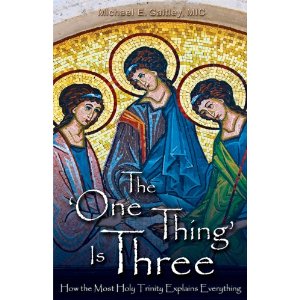 When I was in graduate school studying theology, I took a course on the Trinity. It featured a very large scholarly book and lots of Greek words. I found it fascinating, but understood relatively little. There is a reason why the Trinity is considered a mystery.
When I was in graduate school studying theology, I took a course on the Trinity. It featured a very large scholarly book and lots of Greek words. I found it fascinating, but understood relatively little. There is a reason why the Trinity is considered a mystery.
In The ‘One Thing’ is Three: How the Most Holy Trinity Explains Everything, Fr. Michael Gaitley makes a valiant attempt to simplify the mystery. “[This book is] meant to bring the Trinity home to our hearts [and]make difficult theology easy to understand.” The core of the mystery of the Trinity is the concept of communion – living in communion with God and others.
Gaitley focuses on John 17:24-26 as being the greatest passage of Scripture, “a passage that reveals the mystery at the Heart of the Word made flesh and the deepest expression of communion.” Jesus’ “burning desire” is “That we all be one. He wants us all to participate in the communion of love of the Most Holy Trinity.”
The book is divided into three sections, or points: Communion with the Trinity (our final end), Transforming Communion with Christ (our immediate end), and The Mission of Communion (Our Mission.) If you are already feeling overwhelmed, there is no need to worry. Gaitley takes each point step by step and does his utmost to explain them in a simple and conversational, yet theologically sound, style.
In “Communion with the Trinity,” salvation is explained as being a combination of redemption and glorification. “In saving us, God wants to make us share in his own divine life.” While Satan works to distract us from the good things God offers us, we are offered a choice between “communion or alienation, life or death, eternal bliss or eternal hell. Do we want to serve God or serve ourselves? Will we do God’s will or our own?. . . The heart of the question really is this: Do we want to be truly happy?”
“Transforming Communion with Christ” discusses the incarnation, the great sacrifice of Christ and the gift of His passion. Gaitley also explains the Mass as “the source and summit of the Christian life,” in which we offer “our praise, our sufferings, our worries, and our whole selves.” He focuses on the sacraments of Baptism and Eucharist and emphasizes that sacraments do something – they cause an actual change in those that receive them.
Point Three, “The Mission of Communion” invites us to “share in the mission of Jesus Christ.” Gaitley describes the roles of priest, prophet and king as they apply to those in the hierarchy, laity, and consecrated life. He offers a special emphasis on the role of the laity – “to make God visible in the world.” The highlight of this section is an interview with the Culture of Death which is guaranteed to make one think about the world we live in and our role in it.
Gaitley also offers two appendixes. One offers an introduction to Divine Mercy. The other provides a list of recommended readings.
The ‘One Thing’ is Three explains the Trinity in a way most people will be able to understand. Gaitley has made a concerted attempt to simplify some very difficult concepts, but it still could not be considered easy reading. One will not want to rush through this book, but rather spend some quality time with each section and allow the words and concepts to sink in. This book would be great in a group study or as a text in a college religion class.



